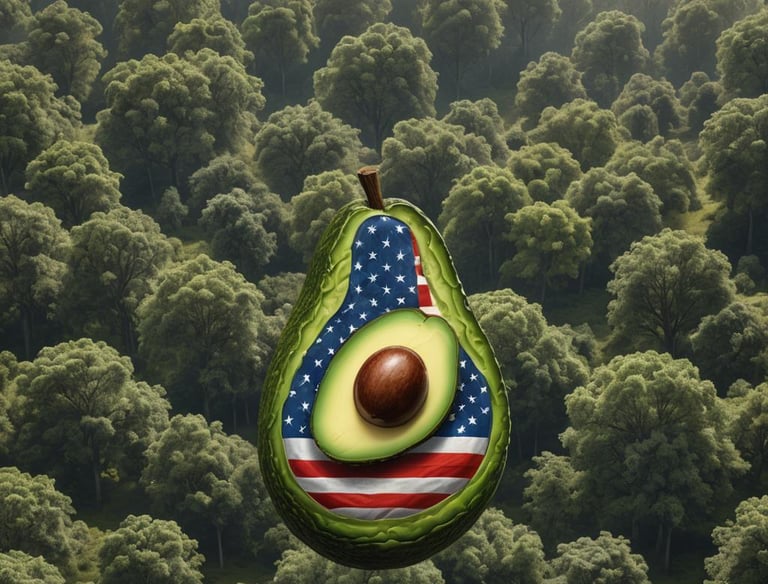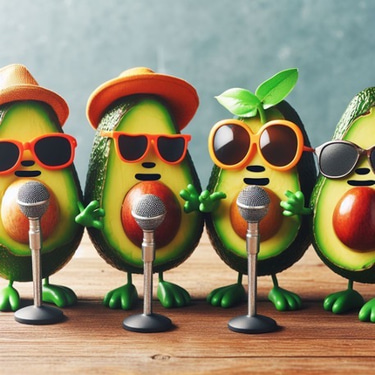Latest Activity
The iconic California avocado is in trouble and this farmer is fighting to save it. Read the story on the LA Times site here
Listen to our own Norm Kachuck on the Special Sauce podcast with Ed Levine here
Welcome to the American Avocado Farmers Website!
By Norman Kachuck
Over the past three decades, we’ve all been selling our wonderful fruit, but also watching with increasing concern as the evolution of our domestic industry’s pipeline has incorporated trends that are jeopardizing our place in it as avocado growers, but have been to the advantage of many of our packers, handlers and importing colleagues.
This website has been established to get the word out about how this situation came to be, and to help our community come together to ally in common cause with our entire avocado domestic industry to protect our groves and businesses.
We need to realign our priorities to combat the trends that are putting domestic growers at increasing risk of being forced out of the market by unfair, unregulated, and corrupted import trade competition.
Importers are flooding our market with unprecedented amounts of fruit, and there has been no attempt by them, or US trade officials, to assure that California producers have a level playing field to compete on. The overwhelming influx of unregulated “conflicted” imports grown without appropriate oversight as mandated by our trade treaties is threatening our financial future as a domestic industry.
We are asking that the USDA and the State Department be tasked with inspecting the import pipeline from tree to consumer, to verify and assure us and our consumers that importing growers, packers and shippers comply with the same sustainability-guided, legal and ethical rules of the road that we American avocado farmers do. And to continue to exact penalties and suspensions of trade until this is achieved and maintained.
We need to make it clear that there are critical issues that we all need help in addressing. The message must get out to our state oversight bodies, as well as those elected officials committed to the safe, healthy, sustainable and ethical production of foods for purchase and consumption at both state and federal levels of governance.
On this site you’ll find background material and updates on the challenges currently faced by American avocado farmers. In critical ways, some of these have been compounded as a result of the actions, and inactions, of the representative organizations created to advocate for us. These are the California Avocado Commission (the “CAC”), created under the California Department of Food and Agriculture, and the USDA’s Hass Avocado Board (the “HAB”).
It’s been wonderful seeing the increasing popularity of the avocado for the American consumer, and clearly it is now a staple component of the American diet. And we have our industry boards and commissions to thank for the massive and successful marketing programs that have made avocados one of the most popular fruits in the country.
However, the economics of the market over the last several years have created a crisis in maintaining the viability of the domestic avocado growers’ enterprise. The shrinking of the domestic avocado acreage, harvest sizes and profitability, then the economic consequences of the Covid19 epidemic, followed by very poor 2023 year’s volume and prices, and the continued reduced productivity for the 2024 harvest, are truly worrisome trends.
California growers are seeing a continued set of stresses on our harvests as well as our profitability. This is a conflation of many factors: erratic, unpredictable weather conditions and their effects on tree health and fruit production; escalating costs for water, electricity, and supplies; regulatory requirements to fulfill safe use of pesticides, fertilizers, soil amendments; and the safety, availability and pay for skilled labor.
But all of that could be coped with, save for the most critically unmanaged aspect of our ability to sell our fruit and realize income to meet our expenses: the continuing competition from foreign sources who are evidently able to produce avocados for the market at a small fraction of the expenses we incur in domestic farming costs, and who can allow the prices to drop well under any chance of profitability for us.
Our priorities for issues and changes fall into these four areas of concern:
1. Failures of the Board of the California Avocado Commission to honor its obligations to the California producer.
The governing board of the CAC has become dominated by members of the importer/packer/shipper/farm management services parts of the community. Many of them have qualified for board seats reserved for growers through a family or business-related ownership of avocado groves, or through a “causing to be produced” provision that misleadingly allows association with farm management of a grove to be designated as a producer, but yet are not required to show that they are eligible for assessments as growers. As board members whose financial success is increasingly dependent on the importation of foreign fruit, their ownership is not just of domestic operations, but also of the means of packing and importation in and from Central and South America. The potential conflicts of interest and commitment created by the dual allegiances with grower and handler have not been effectively managed, and the overseeing California Dept of Food and Agriculture has avowed to permit the CAC to “self-govern”, claiming no jurisdiction.
The CAC Mission Statement reads: “To maximize grower returns by enhancing premium brand positioning for California avocados and improving grower sustainability.” While the CAC board is supposed to execute policies to the benefit their own country’s farmers, it has moved instead to suppress actions which would have benefited growers, while advocating for and operationalizing proposals to increase the volume of avocado sales regardless of country of origin.
2. The lack of input by growers into the priorities being established for resources controlled by the Hass Avocado Board
HAB was created to focus on its capacity as a source of market growth in the US, but it was originally to have also been a way to safeguard the role of the domestic avocado suppliers as the market grew. Which it has not done. In spite of this now-entrenched imbalance in mission priorities, the HAB has not allowed or initiated a referendum on its work in the 23 years since its creation. This is in violation of its formation principles.
3. Environmental concerns and the increasing involvement of organized crime in the Mexican avocado industry.
We’ve just seen the second suspension of avocado importation from Mexico due to physical threats to American inspectors in Michoacán. Our difficulties in competing with that import pipeline, on which our importer colleagues depend for much of their financial success, is now being seen in the context of continuing reporting on the violence being done to the local economies of importing Mexican producers by
organized crime and cartel control of the growing regions
expropriation and illegal and unethical deforestation of land repurposed for use by their avocado industry,
the lack of uncorrupted oversight and governance in the avocado growing regions,
The likelihood of continued lack of Mexican government vigilance over the region. This is likely to worsen, with the last election’s solidification of an increasingly autocratic governing party and its leaders.
4. The lack of aggressive lobbying to protect us and the American consumer from being complicit in the Mexican crisis is a part of the negative and unappealing picture that is being painted of how avocados are grown and marketed there, and should be increasing attention to how we do things differently here.
The needs and representation required by the founders of both the CAC and HAB in these organizations serving the American avocado grower are presently not being adequately addressed by either. It would be in all of our best interests to see to the following actions:
Mitigation of the violations of conflict-of-interest statutes in the eligibility of candidates for board positions of the HAB and CAC. And an audit of the voting process to identify voting by unauthorized proxy representatives of members.
Uniform regulatory policies are currently governing the work US farmers, from which foreign producers are exempt, even though they receive enormous benefits from marketing we are paying for.
We demand investigation into how the US trade agreements and food sourcing laws are possibly being flouted, and aggressive moves taken to regain a reasonable trade balance with the import sector.
A robust state market-wide version of California AB865, with meaningful penalties for violations of the rules to ensure that food sold in the state is reliably sourced, would be a step in the right direction.
Redirection of programming and budgeting of CAC and HAB using monies derived from the tithes taken from grower income currently entirely spent on marketing redirected to steps enforcing fair trade practices and strategies for ensuring the viability of the domestic agricultural enterprise.
Our political leaders and oversight committees, departments and offices must induce the CAC to work with the California Department of Food and Agriculture, and both CAC and HAB to cooperate with the US Department of Agriculture, the US Trade Commissioner, and our elected government representatives help us pursue some redress of the failures of adequate oversight of our agricultural trade sector.
We American Avocado Growers need for these representative organizations, funded by us, to re-establish policies and programs which will facilitate the flourishing and success of our work in supplying our fruit to the country and the world.


